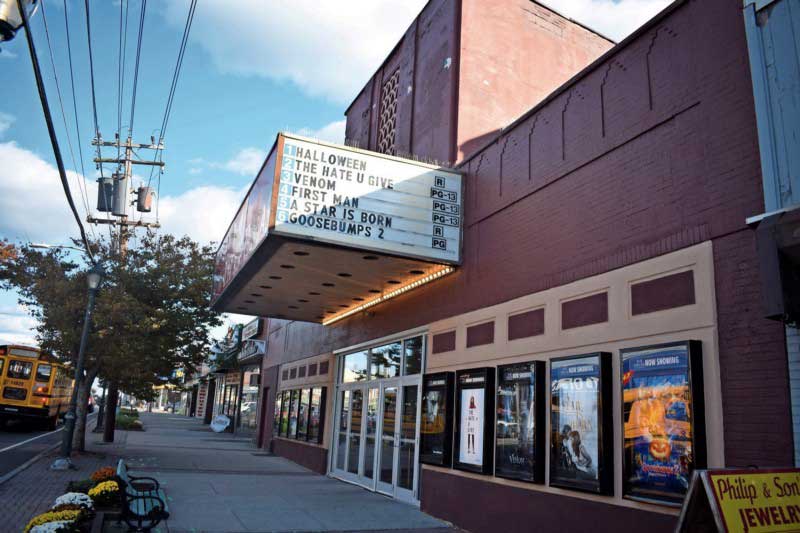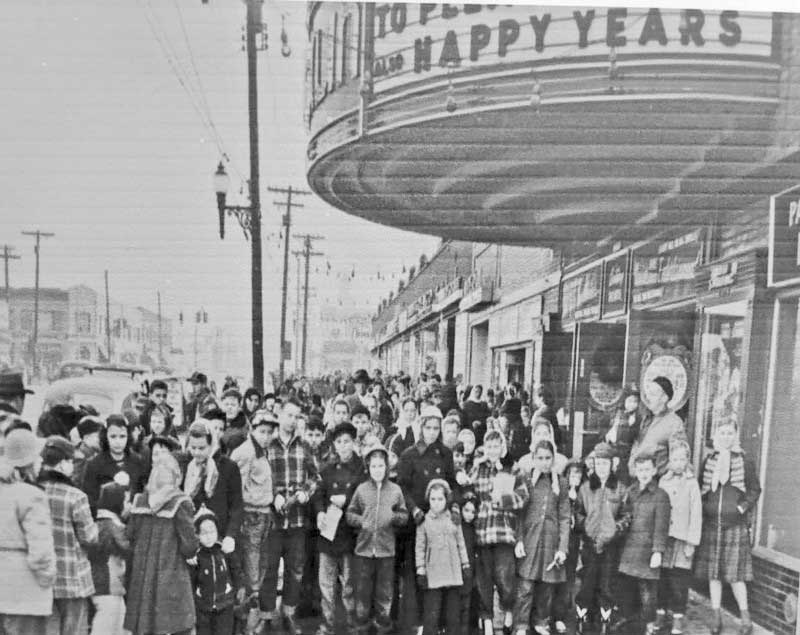By Robert Traverso
Franklin Square officially has a new landmark, after the Hempstead Town Board voted unanimously on Oct. 2 to grant the hamlet’s movie theater historic status.

This Franklin Square movie theater, which is among the few Art Deco structures left in the Town of Hempstead, was recently granted historic landmark status by the Town of Hempstead.
RONNY REYES/HERALD
The Franklin Theatre, which became Bow Tie Cinemas in 2013, was built in 1933 by famed architect Abraham Schwartz, and is believed to be the only Art Deco movie theater still standing in the township. “It is very important for us to preserve the beauty that makes people want to live in the Town of Hempstead,” Supervisor Laura Gillen said before the board’s vote.
Last year, developer Nauman Hussain bought the property adjacent to the theater to build a three-story, self-storage business. Those plans did not include demolition of the movie theater, but Franklin Square Civic Association member Katherine Tarascio said she and other residents worried that once Bow Tie Cinemas’ lease ended in three years, Hussain might demolish the structure to build a parking lot for the storage facility.
To prevent that, Tarascio and members of the Community League of South Garden City Inc. submitted an application for landmark status to the town’s Landmark Preservation Commission, which voted unanimously last No-vember to proceed with a hearing on landmark status.

COURTESY BILL YOUNGFERT
At the hearing last week, Tarascio reminded the board of the theater’s historic architecture, saying it “demonstrates typical small-scale Art Deco design.” Art Deco, a style that surfaced in France before World War I, is known for its combination of historic and then-modern designs. Tarascio argued that the building’s exterior has not changed significantly since it was erected by Schwartz in 1933, and the original brickwork is still noticeable.
“Designation would protect the exterior of the Deco theater from insensitive renovations,” Tarascio said, “and preserve this example of traditional genre buildings for hopefully many years to come.”
But Wayne Edwards, an attorney representing Hussain, argued that since ownership of the theater has fluctuated and its interior “has been substantially altered,” it does not qualify for historic landmark status.
The theater has been renovated in the past six decades: In 1963, its marquee was removed; in 1980, it was expanded and converted into a duplex; and in 2001, the building was painted maroon and lightboxes advertising the movies playing there were installed.
Edwards also characterized the pro-designation argument as, “Basically, ‘Everyone loved going to [the] Franklin Square movie theater,” suggesting that this view is not evidence-based enough to merit landmark status.
But Margaret Kelly, president of the Garden City South Community League, rejected Edwards’s arguments, saying that the changes made to the former Franklin Theatre’s interior are irrelevant to its historic significance.
“The interior of the building has absolutely nothing to do with historical status,” Kelly said. “It doesn’t matter what that building becomes, as long as the exterior . . . remains the same.”
Kelly, a lifelong Franklin Square resident, also rejected Edwards’s analysis of the pro-designation argument. “I’m here as a civic leader,” she said, “and this is part of our civic pride.”
Franklin Square’s downtown is regarded as a small-business hub, and the theater is considered by many residents to be key to maintaining that environment. “Despite some insensitive alterations to the theater’s original Art Deco, grandeur remains evident,” said Sarah Kautz, director of Preservation Long Island, “and its prominent role in the Franklin Square residents’ sense of place is as strong as ever.”
She noted that preservation of another historic movie theater, in Riverhead, played a “key role” in “the revitalization of its surrounding community,” and suggested that granting the former Franklin Theatre historic status would have “enormous potential to enhance downtown revitalization efforts in Franklin Square.”
“We want our downtown to maintain and improve upon its walkability, to be aesthetically pleasing, to support businesses that are an asset to our community and to reflect what Franklin Square feels like — a small hometown,” Tarascio explained. “We seek to preserve our past, not for the sake of nostalgia or preventing change, but as a way to maintain our sense of place and move sensibly forward into the future.”
The movie theater is the fourth building in Franklin Square that has been landmarked, according to Bill Youngfert, a historical society member. He said the group is now establishing a Franklin Square Landmarking Committee that will work with Tarascio to preserve other historic properties in the area.
To help out with the effort, Youngfert asks residents to send contributions to the Franklin Square Historical Society, P.O. Box 45, Franklin Square, N.Y. 11010. Anyone who contributes more than $30 will receive a free one-year membership in the society, he said, and anyone with questions should call Vice President Nancy Youngfert at (516) 352–8376.
Melissa Koenig, a graduate of Hofstra’s five-year journalism bachelor’s-master’s program who is now assistant editor of the Franklin Square-Elmont Herald, contributed to this story.
This story originally appeared in Herald Community Newspapers. It appears here by permission. To view the original, click here.






